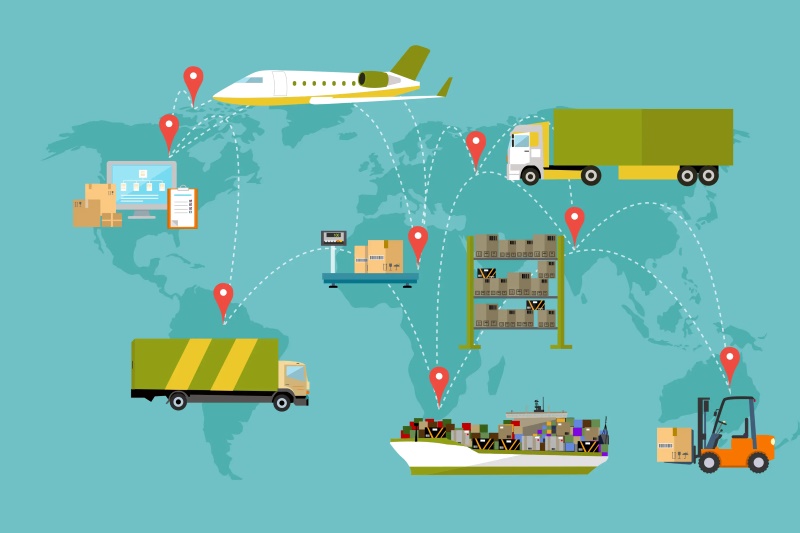In today's fast-paced global economy, businesses rely on efficient international logistics networks to meet customer demands and maintain competitiveness. A reliable logistics network offers streamlined processes, timely deliveries, and cost-effective solutions tailored to the needs of companies involved in cross-border trade. With the right logistics network, businesses can achieve faster delivery times, optimized routing, and enhanced supply chain visibility. This article delves into the key features, benefits, and unique value of an effective international logistics network.

1. What is an International Logistics Network?
An international logistics network is a cohesive system of transport, warehousing, and information-sharing channels that enables the smooth movement of goods across borders. It integrates various modes of transport—including air, sea, road, and rail—with advanced technology to provide visibility, track shipments, and ensure efficient customs clearance. Companies that leverage an established logistics network can manage the complexities of international shipping with ease, from document handling and compliance to warehouse management.
Key Features:
Multi-Modal Transport: Flexibility with air, sea, rail, and road options, allowing tailored solutions for diverse shipping needs.
Global Warehousing: Strategically located storage facilities that support efficient inventory management and distribution.
Real-Time Tracking: Advanced tracking technology provides up-to-the-minute location information for shipments.
Customs and Regulatory Expertise: In-depth knowledge of international customs ensures smooth cross-border operations.
With these features, businesses can confidently expand into new markets and deliver consistent, reliable service to customers worldwide.
2. Top Benefits of a Reliable International Logistics Network
Faster Delivery Times
Speed is critical in today’s marketplace, especially as customers expect timely deliveries. An efficient logistics network reduces transit times by optimizing routes and choosing the most effective transport mode based on destination, cargo size, and urgency. In addition, multi-modal options allow for quick adjustments in case of delays in one mode, ensuring goods reach their destination promptly.
Optimal Routing: By leveraging data and technology, logistics networks create optimized routes that avoid congested areas and cut down delivery times.
Agile Response: The ability to pivot between modes of transport helps avoid delays, particularly during peak seasons or high-traffic routes.
Cost-Effective Solutions
Effective logistics networks reduce costs by streamlining every step of the supply chain. Leveraging economies of scale and automated processes, logistics providers can minimize expenses associated with warehousing, transport, and handling. Furthermore, partnering with established providers allows businesses to access better rates for both freight and warehousing.
Bulk Shipping Discounts: With consolidated shipments, companies can save significantly on per-unit transportation costs.
Optimized Inventory Levels: Access to global warehousing facilities means businesses can store goods closer to key markets, reducing last-mile delivery costs.
Increased Visibility and Transparency
A top-tier logistics network offers real-time tracking, giving businesses and customers the ability to monitor shipments at every stage. This transparency builds trust with customers and allows companies to proactively handle delays, inventory shortages, and delivery complications.
Enhanced Tracking Technology: GPS and IoT solutions provide precise shipment location and ETA information.
Clear Communication Channels: Automated alerts and reports help both businesses and customers stay informed of any potential delays.
Improved Inventory Management
With global warehousing and distribution facilities, a reliable logistics network enables businesses to manage inventory levels efficiently. This reduces the need for excessive safety stock, optimizes order fulfillment, and provides the flexibility to adjust inventory based on real-time demand.
Just-in-Time (JIT) Inventory: Efficient logistics support JIT practices, reducing the cost of holding stock and improving cash flow.
Strategic Stock Location: Placing stock closer to key markets reduces delivery times and increases customer satisfaction.
Risk Mitigation and Compliance Expertise
Navigating international trade regulations and customs compliance can be daunting. A seasoned logistics provider has the expertise to handle regulatory complexities, minimize customs delays, and ensure that shipments adhere to international standards. This reduces the risk of fines, holds, and additional expenses.
Expert Customs Handling: Professionals with local knowledge ensure that goods clear customs smoothly.
Minimized Financial Risk: Compliance with regulations lowers the risk of penalties and delays, protecting a business’s bottom line.
3. Key Features of a High-Quality International Logistics Network
Advanced Technology and Automation
A reliable logistics network leverages cutting-edge technology to improve operational efficiency, enhance accuracy, and reduce human error. Automation in areas like document processing, inventory management, and route optimization allows logistics providers to handle higher volumes while ensuring top-tier service quality.
Automated Documentation: Automated customs paperwork and labeling reduce the potential for errors.
AI-Driven Route Planning: Artificial intelligence optimizes route selection based on real-time traffic and weather conditions.
Multi-Layered Security Measures
International shipments are exposed to various security risks, including theft, loss, and damage. Reliable logistics providers employ robust security measures such as cargo tracking, surveillance, and secure warehousing to ensure that goods arrive safely at their destination.
Secure Warehousing: Facilities are equipped with surveillance and security personnel to protect stored goods.
Shipment Insurance Options: Coverage options for high-value or sensitive cargo provide additional peace of mind.
Flexible and Scalable Solutions
Every business has unique needs, and an effective logistics network offers flexible solutions that adapt to changing requirements. This includes scalability, as logistics networks can accommodate higher volumes during peak seasons or adjust for smaller loads when necessary.
Seasonal Scalability: Increased capacity during peak demand helps businesses maintain service quality without delays.
Flexible Storage Solutions: Temporary or long-term storage options accommodate fluctuations in inventory demand.
4. Use Cases for a Reliable International Logistics Network
E-Commerce and Retail
In the e-commerce sector, quick and accurate deliveries are critical for customer satisfaction. A strong logistics network provides e-commerce businesses with the agility to handle high volumes, manage returns efficiently, and deliver orders swiftly across borders.
Automotive and Manufacturing Industries
Manufacturers rely on timely delivery of components to keep production lines running. A dependable logistics network minimizes supply chain disruptions, ensuring components are delivered on time, reducing costly downtime and production delays.
Healthcare and Pharmaceutical
Pharmaceuticals and medical equipment require specialized logistics solutions, often with temperature-controlled environments and strict timelines. An experienced logistics provider with a reliable network ensures sensitive products remain within required conditions, preserving their quality and efficacy.
5. The Value of an International Logistics Network in Today’s Market
A high-performing international logistics network offers crucial advantages for companies seeking to expand their reach and meet growing customer expectations. In an increasingly interconnected world, businesses must deliver exceptional service across borders, and a reliable logistics network is the foundation of that capability.
Key Value Points:
Enhanced Efficiency: Automation and route optimization lead to faster, more accurate deliveries.
Cost Savings: Reduced operational costs and bulk shipping discounts contribute to better margins.
Customer Satisfaction: Transparency and timely deliveries build trust and improve brand reputation.
Global Reach with Local Expertise: Logistics providers with a strong network offer local insights, improving compliance and reducing delays.
Scalable Growth: A reliable logistics network supports business expansion without compromising service quality.
Conclusion
A reliable international logistics network is an invaluable asset for any company engaged in global trade. From reducing transit times to cutting operational costs and enhancing visibility, it provides the critical infrastructure that businesses need to thrive in the global marketplace. With advanced technology, flexible solutions, and multi-modal transport options, an effective logistics network empowers businesses to meet customer expectations, expand into new markets, and achieve long-term success.
Investing in a high-quality logistics network is not just about efficient shipping; it’s about positioning your business as a dependable, customer-focused brand in a competitive international market. Whether your goal is to enhance efficiency, reduce costs, or improve customer satisfaction, a reliable logistics network will provide the foundation for sustainable growth and competitive advantage in global trade.























